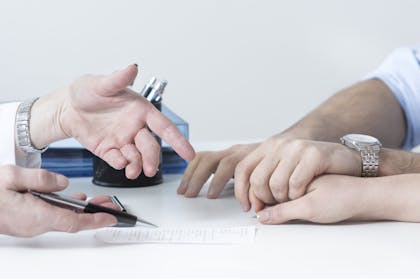Struggling with fertility problems when you're trying to conceive can be incredibly stressful and distressing. So what should you do if you've spent months trying to get pregnant with no success? Here's what you need to know...
This page contains affiliate links, which means we may earn a small amount of money if a reader clicks through and makes a purchase. All our articles and reviews are written independently by the Netmums editorial team.
How do you know if you have a fertility problem?
Everyone is different, and it's important to remember that it does take time to get pregnant. Yes, some people become pregnant very quickly, but it’s also common for people spend up to a year trying to conceive, so try and keep that in mind.
Also bear in mind that many couples with fertility problems go on to conceive either naturally or after fertility treatment. Try to stay positive.
〝 About 84% of couples will conceive naturally within one year if they have regular unprotected sex. 〞
Dr Geetha Venkat, fertility expert and Director of Harley Street Fertility Clinic, explains how long to wait before seeking help:
FREE NEWBORN NAPPIES
'I recommend that if you are aged 35 or older, give yourself around 6 months before seeking help. If you’re younger, then you may want to try for up to 12 months before going to your GP for advice. If you've been having regular unprotected sex for over a year and haven't conceived, then you should speak to your doctor.'
Read more about how long it takes to get pregnant .
And remember, it takes two to get pregnant:
'Fertility issues affect both men and women alike. If you are experiencing problems getting pregnant, it’s important for both partners to undergo health checks. The earlier you’re diagnosed, the more likely you are to go on to have a baby,' says Dr Venkat.
How does age affect your fertility?
According to the latest ONS figures, the average age a woman gives birth in the UK has risen to just over 30.
Yet age is an important factor when it comes to conceiving. The average woman’s fertility begins to decline in her mid-30s.
And it’s not just women whose fertility is affected by age. A man’s fertility starts to decline when he reaches 40, which means it could take longer to conceive.
Read more about how age affects fertility.
What causes fertility problems?
According to Dr Venkat, lifestyle changes could resolve fertility issues for some couples.
These include:
- Accurate knowledge and information on when and how often you have sex .
- Adopting a healthy lifestyle.
- Maintaining a healthy BMI – weight can cause complications during pregnancy and also has a profound effect on fertility. In fact, research shows that overweight and obese women also have poorer outcomes following fertility treatment.
- Exercising – exercise lowers your blood pressure, lessens anxiety, treats depression and encourages sound sleep – all of which is helpful if you’re trying for a baby. That said don’t overstrain your body; try for an optimum 30 minutes exercise a day and keep at a stable, healthy weight to increase your chances of conceiving. Moderation is key.
- De-stressing – stress and its impact on fertility is difficult to quantify, but managing stress is important. Try going for a swim or a walk or using relaxation methods like yoga or mindfulness. For some women, severe stress may delay ovulation, resulting in irregular cycles and making it more difficult to conceive.
However, there are other causes of infertility that you may not even know about, such as:
- Ovulation problems
- Tubal blockage or endometriosis
- Male sperm problems
- Women's health conditions such as polycystic ovary syndrome (PCOS)
Your doctor will explore all of these with you and offer you the most appropriate advice and tests.
What fertility tests do you need?
Your first stop should be your GP, who is likely to recommend a series of test. These are likely to include:
- Sperm tests
- Blood tests to check you are ovulating
- Test for chlamydia, a common STI which can cause fertility problems
If these are inconclusive, you may also be offered an ultrasound to check your uterus and fallopian tubes. You might also be offered an HSG x-ray to make sure there are no blockages in your fallopian tubes.
In around 80% of cases, the cause of the infertility is uncovered during these test.
Depending on your results, you may then be referred to a fertility specialist for treatment.
How do fertility drugs work?
There are a number of options available if you're struggling to conceive and your first port of call is likely to be the drug Clomifene citrate (also known as Clomid). This is an anti-estrogen drug that can help you ovulate regularly and so increase your chances of pregnancy.
Your fertility specialist will prescribe the drug and closely monitor you to see how things are progressing.
As with all drugs, you may experience some side-effects so it's important to gather all the necessary information from your specialist before you start the course.
If you're not ovulating properly within six months and there's no sign of pregnancy, they may suggest other options with you and your partner.
Important note: Do not buy clomid or any fertility drugs over the internet .
What about assisted fertility treatments?
Aside from drugs, there are other treatments which may give you and your partner a greater chance of becoming pregnant. Risks, costs and success rates of the treatments do vary, and your fertility clinic will be able to discuss this with you. Some treatments are linked with multiple births.
Treatments include:
- Intrauterine insemination (IUI): Sperm is injected into your womb, timed with your ovulation.
- Donated sperm, egg or embryos: If you or your partner has problems with eggs or sperm, these can be donated and artificially inseminated.
- IVF: Your egg and your partners sperm are combined in a laboratory and transferred to your womb.
- Surrogacy: This is where another woman carries your baby until it is born - the sperm and egg belong to you and your partner.
Visit the Infertility Network UK website for detail on each of these treatments.
Although current fertility guidelines state that women aged under 40 should be offered three cycles of IVF treatment on the NHS, you'll only be eligible if:
- you've been trying to get pregnant through regular unprotected sex for two years, or
- you've not been able to get pregnant after 12 cycles of artificial insemination.
However, your local healthcare trust may have additional (and stricter) criteria on top of these so speak to your GP about your chances of IVF, if that's considered the right path for you to go down.
Where to find support
- Infertility Network UK . This is the UK's largest infertility charity, offering support and advice to couples experiencing fertility problems. You will find a wealth of information, guidance, as well as the opportunity to talk to others about your experience.
- Fertility Friends . An online community of people on every stage of the fertility journey.
- Consider counselling – find a counsellor at the British Infertility Counselling Association
- Speak to mums in our infertility forums .









